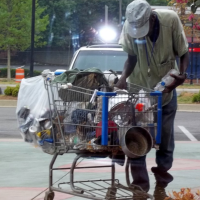Homeless Can Keep Possessions on the Street, but L.A. Clergy Counsels Not to Feed Them There
 Los Angeles Skid Row
Los Angeles Skid Row
You give up a lot of things when you’re homeless, but your constitutional Fourth Amendment right to due process isn’t one of them, according to the U.S. Ninth Circuit Court of Appeals.
In a 2-1 decision handed down last week, the court upheld a U.S. District Court ruling against Los Angeles that blocked the city from scooping up those personal possessions of homeless people left temporarily on the street, unless they are a threat to public safety or part of a criminal investigation.
An estimated 7,000 homeless people roam the streets of Los Angeles’ Skid Row where shelters only have room to house about 5,500 of them at night. The city has been confiscating their stuff, on and off, since at least 2000 when the practice was successfully challenged in court in Justin v. City of Los Angeles.
But the city maintained that a municipal ordinance subsequently gave them the authority to “confiscate the personal property of the homeless when it has not been abandoned and [destroy] it without notice.” The city was sued in April 2011 and accused of violating the First, Fourth and Fourteenth amendment rights of the homeless.
Writing for the majority, Judge Kim McLane Wardlaw said, “The City has instead asked us to declare that the unattended property of homeless persons is uniquely beyond the reach of the Constitution, so that the government may seize and destroy with impunity the worldly possessions of a vulnerable group in our society. Because even the most basic reading of our Constitution prohibits such a result, the City’s appeal is DENIED.”
Judge Consuelo M. Callahan, an appointee of President George W. Bush, disagreed. She wrote: “Common sense and societal expectations suggest that when people leave their personal items unattended in a public place, they understand that they run the risk of their belongings being searched, seized, disturbed, stolen, or thrown away.”
While the courts made it easier for the homeless to keep their belongings on the street, a group of Los Angeles clergy is urging that people not feed them there. The Downtown Clergy Council, in a recent position paper, argued that handing out food in public to homeless people leads to trash and vermin problems, and encourages them to avoid eating in shelters where more of their basic needs can be met.
The council’s tough love document maintained that, “So long as it is easier to live on the street than it is to face making changes in their behavior and lifestyle many will continue to choose the streets.” The clergy discounted reasons given by homeless people for not utilizing the services of missions or service groups.
They said: Complaints about having to listen to sermons were unfounded; lines are, indeed, long but they move quickly; a mission may run out of food but there is always food at another mission nearby; and good food is served by kitchens that “have higher ratings than many of the restaurants you the public frequent.”
The clergy encouraged people to take a look around Skid Row where, “You will not see one hungry or naked person in the area unless they are under the influence of drugs, mental illness or both.” Some might respond that many, if not most, of those on Skid Row fit at least one of those categories.
In making the plea to “well-meaning” individuals to stop dispersing food on the street, the clergy urged that people, instead, pass out hygiene kits and bottled water, help clean the streets, give money to local shelters and work with existing missions that help the homeless.
The problem, they said, isn’t hunger. “If you look deeper, you will find that it is impossible to go hungry in Skid Row.”
–Ken Broder
To Learn More:
Lavan v. City of Los Angeles (U.S. Ninth Circuit Court of Appeals) (pdf)
Court Rules That L.A. Can't Destroy Homeless People's Property (by Maura Dolan, Los Angeles Times)
Appeals Court Says Skid Row Homeless Can Leave Possessions on Sidewalks Temporarily (by Tony Pierce, BlogDowntown)
LA Clergy Group: Stop Feeding Homeless on Skid Row (Associated Press)
How to Make the Influence of the Service Community Stronger than the Influence of the Streets! (Downtown Clergy Council) (pdf)
- Top Stories
- Controversies
- Where is the Money Going?
- California and the Nation
- Appointments and Resignations
- Unusual News
- Latest News
- California Forbids U.S. Immigration Agents from Pretending to be Police
- California Lawmakers Urged to Strip “Self-Dealing” Tax Board of Its Duties
- Big Oil’s Grip on California
- Santa Cruz Police See Homeland Security Betrayal in Use of Gang Roundup as Cover for Immigration Raid
- Oil Companies Face Deadline to Stop Polluting California Groundwater





